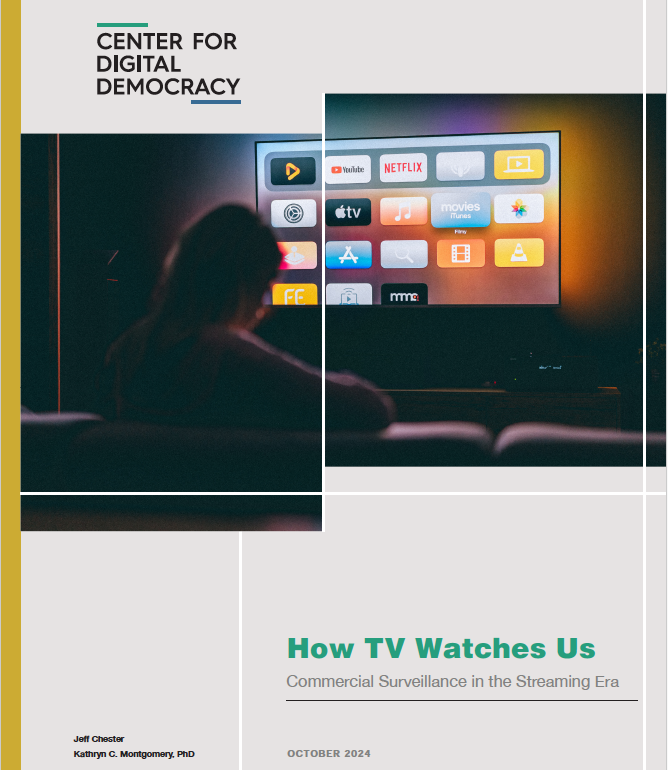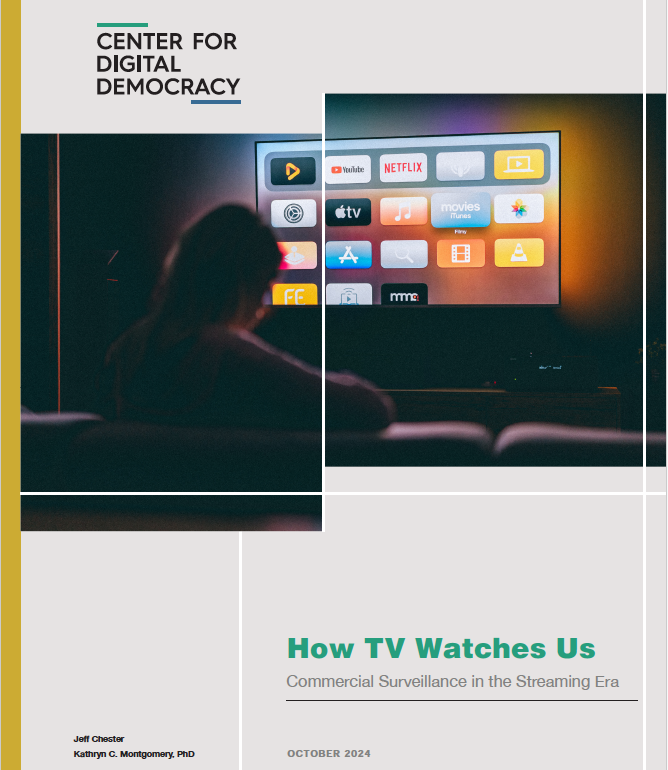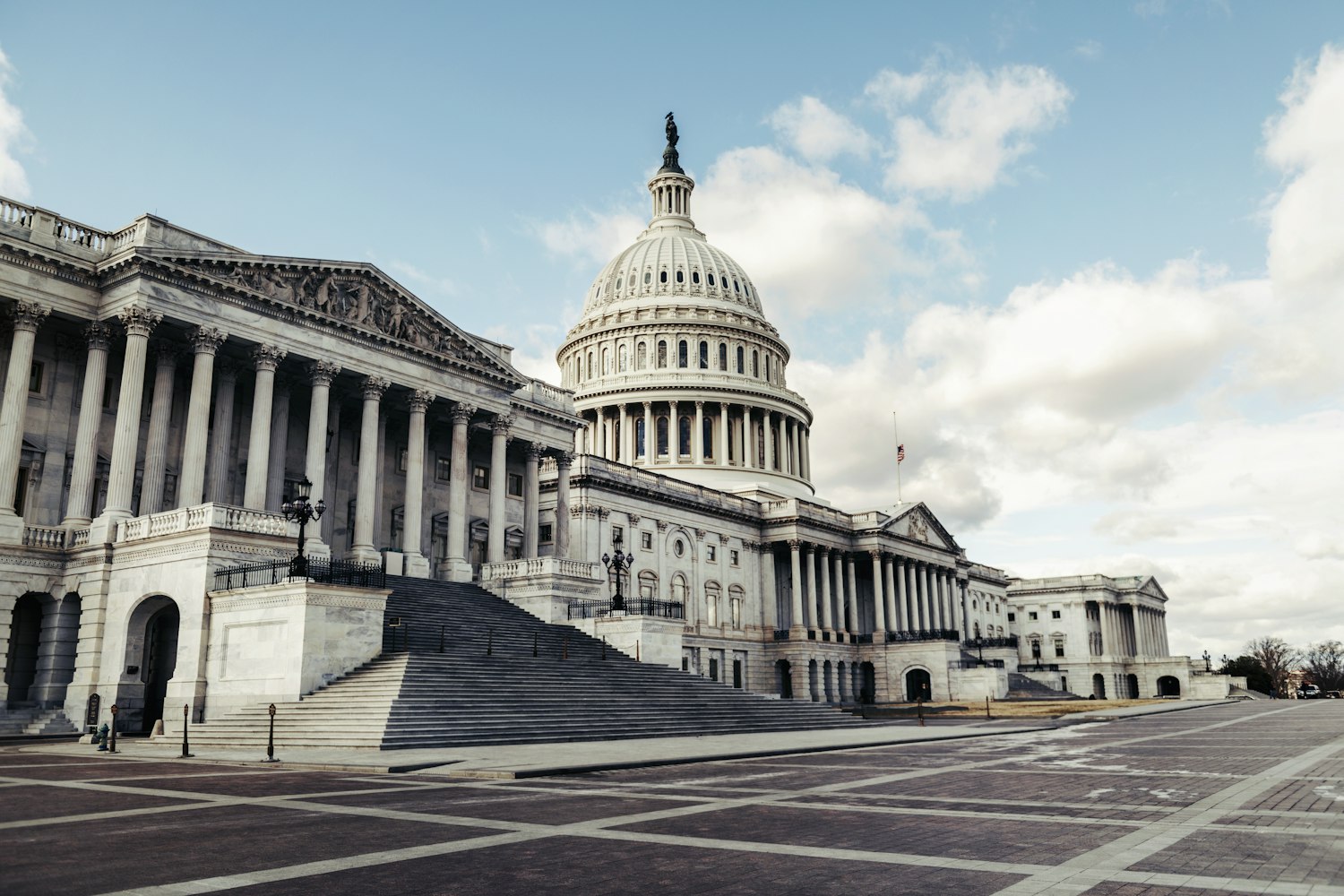
program areas Digital Consumer
Program Areas
-
Press Release
Advocates Urge FTC to Halt Meta’s Plan to Use AI Chatbot Data for Ads
Meta’s chatbot data grab risks normalizing surveillance-driven marketing across the industry, setting a dangerous precedent for privacy and consumer protection.
Contact: Jeff Chester, 202-494-7100 Jeff@democraticmedia.org John Davisson, 202-483-1140 davisson@epic.orgAdvocates Urge FTC to Halt Meta’s Plan to Use AI Chatbot Data for Ads Meta’s chatbot data grab risks normalizing surveillance-driven marketing across the industry, setting a dangerous precedent for privacy and consumer protection.Washington, D.C. A coalition of 36 privacy, consumer protection, children’s rights, and civil rights advocates and researchers today called on the Federal Trade Commission (FTC) to investigate and halt Meta’s recently announced plan to use conversations with its AI chatbots for advertising and content personalization. The letter, sent to FTC Chair Andrew Ferguson and Commissioners, urges the agency to exercise its oversight authority and act under both Meta’s existing consent decree and Section 5 of the FTC Act to stop this practice from moving forward.On October 1, 2025, Meta announced that beginning December 16 it would use chatbot interactions on Facebook, Instagram, and WhatsApp to inform ad targeting and personalization. These conversations often contain highly sensitive disclosures - including health, relationship, and mental health information - yet Meta has provided no opt-in consent mechanism and no assurances of heightened privacy or security safeguards.In the letter, the coalition calls on the FTC to:Enforce Meta’s existing consent decrees and require disclosure of risk assessments;Treat the practice as an unfair and deceptive act under Section 5 of the FTC Act;Suspend Meta’s chatbot advertising program pending Commission review;Finalize the long-pending modifications to the 2020 order to strengthen privacy protections, including a proposed prohibition to monetize minors’ data.The groups are also urging the Commission to disclose its findings publicly.The coalition emphasizes that Meta’s initiative is not a marginal product feature but part of a deliberate strategy to expand surveillance-driven marketing. Without FTC intervention, they warn, Meta’s actions will normalize invasive AI data practices across the industry, further undermining consumer privacy and protection.Quotes“The FTC cannot stand by while Meta and its peers rewrite the rules of privacy and consumer protection in the AI era. Chatbot surveillance for ad targeting is not a distant threat—it is happening now. Meta’s move will accelerate a race in which other companies are already implementing similarly invasive and manipulative practices, embedding commercial surveillance deeper into every aspect of our lives.” Katharina Kopp, Deputy Director, Center for Digital Democracy (CDD)“The FTC has a sordid history of letting Meta off the hook, and this is where it’s gotten us: industrial-scale privacy abuses brought to you by a chatbot that pretends to be your friend,” said John Davisson, Director of Litigation for EPIC. “And where is the Trump-Ferguson FTC? Slow-walking a critical enforcement action brought under Chair Khan to protect minors from Meta’s exploitative data practices. Meta’s appalling chatbot scheme should be a wake-up call to the Commission. It’s time to get serious about reining in Meta.” SignatoriesThe 36 organizations that signed to the letter include, among others: Center for Digital Democracy; Electronic Privacy Information Center; Public Citizen; Demand Progress Education Fund; ParentsTogether Action; Becca Schmill Foundation; Center for Economic Integrity; Fairplay; National Association of Consumer Advocates; Consumer Federation of America; 5Rights Foundation; Mothers Against Media Addiction (MAMA); and Common Sense Media. * * *The Center for Digital Democracy is a Washington, D.C.-based public interest research and advocacy organization, working on behalf of citizens, consumers, communities, and youth to protect and expand privacy, digital rights, and data justice.The Electronic Privacy Information Center (EPIC) is a is a 501(c)(3) non-profit established in 1994 to protect privacy, freedom of expression, and democratic values in the information age through advocacy, research, and litigation. For more than 30 years, EPIC has fought for robust safeguards to protect personal information. -
The transfer of TikTok’s United States operation to a group of Trump administration-selected controlling investors should be vigorously opposed, as it would effectively endorse the current extractive system shaping our social media platforms and most other commercial digital services.TikTok orchestrates its social media marketing business in the same ways that Meta and Google do — harvesting our data, leveraging the power of the now ubiquitous generative artificial intelligence products, closely partnering with the most powerful global brands, ad agencies and adtech companies and enabling an array of human and virtual influencers — all to generate the mechanisms of “engagement” that are the core of the commercial surveillance monetization model for our digital media.How are we ever to reform our country’s current digital media giants — as well as the AI behemoths lined up to become new, ad-saturated marketplaces — if our government uncritically sanctions the current business model?A US TikTok should be required, at the very least, to operate its data practices in ways that really protect privacy, shield users from manipulative and unfair marketing tactics, adopt accountable generative AI applications, and serve in ways that strengthen our democracy, including by promoting civic discourse, civil rights and diverse viewpoints.While such proposals may appear to be digital “pie in the sky” aspirations at this perilous political moment, the transfer of TikTok’s US ownership and its connections to recent and pending mega-media mergers is precisely the moment to make our views known and put up a fight.Of course, the debate over TikTok here has focused on owner ByteDance’s relationship with China and the concern that its autocratic government will surveil and target Americans.While that’s a legitimate issue, Google, Meta, Amazon and many other digital media companies are as serious a threat to us personally and collectively. They are all conducting far-reaching data surveillance on Americans (and people worldwide), unleashing algorithms and online content designed to profoundly influence what we think, do and consume. Disinformation on these platforms is not only abundant but supported. As we saw with the Cambridge Analytica privacy scandal and elections in the US and in Europe, US-based platforms can easily be manipulated by foreign and other actors. There are still endless headlines about the latest social media-inspired tragedy — from individual acts leading to suicide and violence to the promotion of hate and even genocide — which sadly illustrate why our digital media system is in desperate need of transformative change.The Trump administration’s unleashing of generative AI technologies, which are now used by our platforms to accelerate and deepen the impact of their commercial surveillance marketing, is hurdling our digital media system to gather and analyze even more information on us and more efficiently deploy it to better sell, influence and direct our behaviors.There is another looming problem with US President Donald Trump’s TikTok plan — the expansion of MAGA-influenced media control over that platform, as well as leading news services, streaming video channels, broadcast stations and media production studios. In particular, this would be the likely role played by Trump ally and the billionaire chair of Oracle Larrry Ellison. Transferring key TikTok assets to be managed by Oracle is key to the White House’s plans.As we know, Ellison’s deep pockets enabled his son David recently to acquire Paramount/CBS. There have already been a number of troubling concessions to the Trump administration to get the deal through, including installing a politically conservative ombudsman at CBS News, acquiring the Free Press website and tapping its founder Bari Weiss to lead CBS’s newsroom.Next on the agenda are the Ellisons’ buying Warner/Discovery/CNN. Their potential control over two major news operations — which would likely see layoffs and staff purges — could provide Trump and his allies greater ability to shape the information narrative to their benefit. A combined Paramount/Warner would also provide the Ellisons’ a slew of streaming video, cable and broadcast channels (including sports and animation), film production facilities, adtech operations and more. Imagine all these media properties, including TikTok, acting synchronously, supporting a MAGA agenda that leverages the massive data gathering and targeting power of contemporary digital platforms to reach individuals and influence their political perspectives.Given Oracle’s considerable business interest and expertise in digital data used for marketing, its “oversight” of a US TikTok algorithm will not lead to better privacy and consumer protections for Americans. Ellison’s Oracle has long provided a host of data tools for digital marketing, and has also added numerous generative AI tools to advance it. The company touts its ability, for example, “to create a connected and personalized experience,” including by combining “online, offline and third-party data with AI and machine learning.” According to reports, ByteDance will still control TikTok’s e-commerce and advertising business in the US. This means that the numerous global and US-based advertisers who have found significant success exploiting TikTok will continue to operate in a business-as-usual manner, able to purchase advertising and influence relatively seamlessly across the globe. Given that access to data is central for this key revenue generator, how exactly will Oracle and ByteDance work together to keep TikTok’s more than $16 billion US revenues flowing? This question demands answers now.There are an array of policy issues that can be used to challenge Trump’s TikTok scheme, helping publicize the need to reforming US digital media and also potentially slow down the final transfer of ownership, including numerous data privacy and consumer protection issues. The Ellisons’ takeover of Paramount/CBS also involves significant data gathering by its streaming video channels, for example. The antitrust implications should be reviewed to address the impact on competition involving TikTok, Paramount/CBS, Warner/Discovery/CNN, Oracle and its many clients.There should be challenges filed at the Federal Trade Commission, Department of Justice and state attorneys general, as well as public hearings on what this means for consumers, creators, young people, journalism and the institutions supporting democratic discourse.A raft of other questions should be raised, including about the proposed set of TikTok’s owners and their own involvement with China and other potential conflicts. For example, Oracle has recently brokered a “gigantic contract” with Chinese-ecommerce company Temu. It is also profiting from serving as TikTok’s cloud computing provider. However, the company is currently experiencing a cash flow problem, according to Bloomberg, and has announced layoffs, raising questions about whether Trump’s TikTok deal is also designed to financially boost an ally.Oracle’s recent expanded alliance with Google to offer that company’s most advanced Gemini AI services on its cloud illustrates the web of digital partnerships that undermine competition and increase the prospects of greater data harvesting. Silver Lake Partners, one of the other proposed US investors, has invested in numerous Chinese companies, including one accused of facilitating surveillance on the ethnic Uyghur community there. Abu Dhabi-based MGX, an AI-focused investment company that is being rewarded a US TikTok ownership role and is supporting Trump’s “Stargate” AI initiative here, has a range of financial relationships, including with Elon Musk and OpenAI, which require scrutiny as well.I was among the digital rights advocates working in Washington, DC, in the very early 1990s as the world wide web became ad supported and commercialized. Our NGO (then called the Center for Media Education) was one of the very few to oppose the role that data tracking would play in delivering targeted marketing. Industry lobbyists and their political allies were successful in making sure there were no impediments to extensive data-mining online — which is why today we still don’t have a federal consumer privacy law.If the internet has an “original sin,” it was allowing the major platforms, their brand advertiser and data-broker partners successfully to transform the internet into a highly centralized and powerful apparatus designed to place the interests of marketers and their oligopolistic platform collaborators ahead of the needs of a civil and equitable society.We are at a critical moment today — just as important as those early days. Generative AI has been rapidly adopted across our digital, industrial and marketing sectors. It is accelerating the capabilities of the commercial surveillance model and, through partnerships and alliances, allowing our current leading online giants and a few newcomers to be among the dominant players.The proposal to allow Trump’s political allies to operate TikTok in the US, without significant reforms and safeguards, as well as likely permitting a MAGA media industry trifecta provides a much-needed opportunity to articulate an alternative vision for US digital media. One reason we have ended up with the current crisis, I believe, has been the historic and collective failure to articulate and support communications policies that would have helped our democracy better thrive. With Trump’s September executive order giving the “divestiture” 120 days to finalize, now is the time to use all our resources — including on TikTok and other social media — to offer a better and alternative outcome.Originally published by Tech Policy Press, October 10, 2025
-
Press Release
WARNING: POSSIBLE HOSTILE TAKEOVER OF FTC BY “DOGE” TEAM UNDER ELON MUSK — CONSUMER PROTECTIONS AT IMMEDIATE RISK
FOR IMMEDIATE RELEASEApril 4, 2025WARNING: POSSIBLE HOSTILE TAKEOVER OF FTC BY “DOGE” TEAM UNDER ELON MUSK — CONSUMER PROTECTIONS AT IMMEDIATE RISKWASHINGTON, D.C. — Alarming reports suggest that individuals associated with the so-called “DOGE team,” acting under the direction of Elon Musk, may be maneuvering to infiltrate and dismantle the Federal Trade Commission (FTC) from within. Sources indicate that DOGE staffers have already embedded themselves inside the agency, potentially with access to sensitive consumer data and a vast trove of corporate trade secrets housed within internal data systems. This setup may be laying the groundwork for illegal mass firings and a reduction in force—an unprecedented power grab that could cripple the FTC’s ability to protect the American public.While details continue to emerge, the pattern is unmistakable. The DOGE team’s recent actions follow a disturbing playbook: bypassing norms, subverting legal processes, and setting the stage for institutional collapse. And there is at least one clear beneficiary—Elon Musk, whose company X (formerly Twitter) remains under a federal consent decree. A neutered FTC would eliminate one of the final safeguards standing between Musk and unchecked surveillance, exploitation, and algorithmic manipulation of users—including children.The very foundation of federal consumer protection is in danger.The FTC plays an irreplaceable role in:● Shielding seniors and veterans from fraud● Defending children’s safety and privacy online● Blocking deceptive advertising and marketing practices● Enforcing limits on monopolistic behavior and AI-driven risks Without a fully functioning FTC, corporations would face fewer consequences, and consumers would be left vulnerable to lawless business practices. This would open the floodgates to a “race to the bottom” economy—one where exploitation, manipulation, and impunity replace fair play, innovation, and trust. The consequences would be dire—especially for children, vulnerable populations, and small businesses.We urge Chair Ferguson and Commissioner Holyoak to act now. Stand firm against the DOGE team’s attempted subversion. Uphold your oaths to the institution—and to the Constitution.The American public deserves a functioning watchdog—not a hollowed-out institution hijacked by billionaires seeking to rewrite the rules in their favor. ***The Center for Digital Democracy is a public interest research and advocacy organization, established in 2001, which works on behalf of citizens, consumers, communities, and youth to protect and expand privacy, digital rights, and data justice. CDD’s predecessor, the Center for Media Education, lead the campaign for the passage of the Children's Online Privacy Protection Act over 25 years ago in 1998. -
Databrokers Pose Growing Financial Risks to Consumers, Including on Streaming TV
Will Trump CFPB do anything at all to protect US consumers?
Leading data brokers play a powerful behind-the-scenes role leveraging their data holdings across the “omnichannel” marketplace. Data brokers are currently in the forefront of providing digital “dossiers” that identify and target U.S. financial consumers, especially through “identity graph” services that enable personalized tracking and microtargeting. This is especially true with the now-dominant digital video streaming system (connected, or CTV) that touches nearly every American household, including those with children. CTV devices and streaming video networks are increasingly AI-driven data processors of consumer financial transactions, offering cross-device monitoring and interactive responses to the behavior of individual consumers. Data brokers are thoroughly embedded in the multiple operating layers of CTV, posing new and greater risks to consumers and their financial applications. The practices we describe are currently pervasive, non-transparent, unaccountable, and harmful—and clearly requiring the updates to the FCRA as proposed by the rule. The Trump Administration’s willful destruction of the CFPB raises questions as to whether consumer financial protection is still a core mission of the agency—and whether it is even possible given the mass firings and abrupt terminations of policies and staff. If the Trump CFPB decides not to enact the rule, it will place the majority of the American public at a new and higher level of financial risk, especially every time they go online or watch programming.Read CDD's full comments in the CFPB Docket "Protecting Americans from Harmful Data Broker Practices (Regulation V)" in the attachment. -
Press Release
In Firing The Two Democratic FTC Commissioners, Pres. Trump Places Every American Consumer At Grave Risk
Statement of Jeff Chester, executive director, Center for Digital DemocracyMarch 19, 2025 In a country where illegality is quickly replacing the rule of law, the action yesterday by Pres. Trump ending the decades of bi-partisan operations at the Federal Trade Commission (FTC) may seem insignificant. But for anyone concerned about lower grocery prices, protecting privacy online, consumer protections for your money when buying goods and services, or whether children and teens can use the Internet without mass surveillance and manipulation, they should be very, very worried. Why did Pres. Trump do this now? It’s because the U.S. is on the verge of a transformation of how we shop, buy, view and interact with businesses online and offline—due to the confluence of Generative Artificial Intelligence, expansion of pervasive data gathering and personalized profiling, and the deepening of alliances and partnerships across Big Tech, Big Data, retailers, supermarkets, hospitals, databrokers, streaming TV networks and many others. Trump’s allies—especially Amazon, Google, Meta/Facebook, and TikTok—do not want any safeguards, oversight or accountability—especially at this time when immense profits are to be made for themselves. The Trump Administration is rewarding the very same billionaires and Tech Giants who are responsible for raising the prices we pay for groceries, obliterating our data privacy, and making it unsafe for kids to go on social media. Consumer advocates won’t be silent here, of course, and we will document and sound the alarm as Americans are increasingly victimized by Big Tech and large supermarket chains. The FTC has been transformed into a Trump Administration and special interest lapdog—instead of the federal watchdog guarding the interests and welfare of the public. Americans who struggle to make ends meet—whether they need help securing refunds, recovering from scams, or ensuring fair treatment—will be especially harmed. But let’s be clear. The action of the Trump Administration to remove the FTC as a serious consumer protection agency has helped make every American further unsafe. --30-- -
Press Release
Streaming Television Industry Conducting Vast Surveillance of Viewers, Targeting Them with Manipulative AI-driven Ad Tactics, Says New Report
Digital Privacy and Consumer Protection Group Calls on FTC, FCC and California Regulators to Investigate Connected TV Practices
Streaming Television Industry Conducting Vast Surveillance of Viewers, Targeting Them with Manipulative AI-driven Ad Tactics, Says New Report.Digital Privacy and Consumer Protection Group Calls on FTC, FCC and California Regulators to Investigate Connected TV PracticesContact: Jeff Chester, 202-494-7100 Jeff@democraticmedia.orgOctober 7, 2024Washington, DC. The Connected TV (CTV) video streaming industry in the U.S. operates a massive data-driven surveillance apparatus that has transformed the television set into a sophisticated monitoring, tracking and targeting device, according to a new report from the Center for Digital Democracy (CDD). How TV Watches Us: Commercial Surveillance in the Streaming Era documents how CTV captures and harvests information on individuals and families through a sophisticated and expansive commercial surveillance system, deliberately incorporating many of the data-gathering, monitoring, and targeting practices that have long undermined privacy and consumer protection online.The report highlights a number of recent trends that are key to understanding today’s connected TV operations:Leading streaming video programming networks, CTV device companies and “smart” TV manufacturers, allied with many of the country’s most powerful data brokers, are creating extensive digital dossiers on viewers based on a person’s identity information, viewing choices, purchasing patterns, and thousands of online and offline behaviors.So-called FAST channels (Free Advertiser-Supported TV)—such as Tubi, Pluto TV, and many others—are now ubiquitous on CTV, and a key part of the industry’s strategy to monetize viewer data and target them with sophisticated new forms of interactive marketing.Comcast/NBCU, Disney, Amazon, Roku, LG and other CTV companies operate cutting-edge advertising technologies that gather, analyze and then target consumers with ads, delivering them to households in milliseconds. CTV has unleashed a powerful arsenal of interactive advertising techniques, including virtual product placement inserted into programming and altered in real time. Generative AI enables marketers to produce thousands of instantaneous “hypertargeted variations” personalized for individual viewers. Surveillance has been built directly into television sets, with major manufacturers’ “smart TVs” deploying automatic content recognition (ACR) and other monitoring software to capture “an extensive, highly granular, and intimate amount of information that, when combined with contemporary identity technologies, enables tracking and ad targeting at the individual viewer level,” the report explains.Connected television is now integrated with online shopping services and offline retail outlets, creating a seamless commercial and entertainment culture through a number of techniques, including what the industry calls “shoppable ad formats” incorporated into programming and designed to prompt viewers to “purchase their favorite items without disrupting their viewing experience,” according to industry materials.The report profiles major players in the connected TV industry, along with the wide range of technologies they use to monitor and target viewers. For example:Comcast’s NBCUniversal division has developed its own data-driven ad-targeting system called “One Platform Total Audience.” It powers NBCU’s “streaming activation” of consumers targeted across “300 end points,” including their streaming video programming and mobile phone use. Advertisers can use the “machine learning and predictive analytics” capabilities of One Platform, including its “vast… first-party identity spine” that can be coupled with their own data sets “to better reach the consumers who matter most to brands.” NBCU’s “Identity graph houses more than 200 million individuals 18+, more than 90 million households, and more than 3,000 behavioral attributes” that can be accessed for strategic audience targeting.”The Walt Disney Company has developed a state-of the-art big-data and advertising system for its video operations, including through Disney+ and its “kids” content. Its materials promise to “leverage streaming behavior to build brand affinity and reward viewers” using tools such as the “Disney Audience Graph—consisting of millions of households, CTV and digital device IDs… continually refined and enhanced based on the numerous ways Disney connects with consumers daily.” The company claims that its ID Graph incorporates 110 million households and 260 million device IDs that can be targeted for advertising using “proprietary” and “precision” advertising categories “built from 100,000 [data] attributes.”Set manufacturer Samsung TV promises advertisers a wealth of data to reach their targets, deploying a variety of surveillance tools, including an ACR technology system that “identifies what viewers are watching on their TV on a regular basis,” and gathers data from a spectrum of channels, including “Linear TV, Linear Ads, Video Games, and Video on Demand.” It can also determine which viewers are watching television in English, Spanish, or other languages, and the specific kinds of devices that are connected to the set in each home.“The transformation of television in the digital era has taken place over the last several years largely under the radar of policymakers and the public, even as concerns about internet privacy and social media have received extensive media coverage,” the report explains. “The U.S. CTV streaming business has deliberately incorporated many of the data-surveillance marketing practices that have long undermined privacy and consumer protection in the ‘older’ online world of social media, search engines, mobile phones and video services such as YouTube.” The industry’s self-regulatory regimes are highly inadequate, the report authors argue. “Millions of Americans are being forced to accept unfair terms in order to access video programming, which threatens their privacy and may also narrow what information they access—including the quality of the content itself. Only those who can afford to pay are able to ‘opt out’ of seeing most of the ads—although much of their data will still be gathered.”The massive surveillance and targeting practices of today’s contemporary connected TV industry raise a number of concerns, the report explains. For example, during this election year, CTV has become the fastest growing medium for political ads. “Political campaigns are taking advantage of the full spectrum of ad-tech, identity, data analysis, monitoring and tracking tools deployed by major brands.” While these tools are no doubt a boon to campaigns, they also make it easy for candidates and other political actors to “run covert personalized campaigns, integrating detailed information about viewing behaviors, along with a host of additional (and often sensitive) data about a voter’s political orientations, personal interests, purchasing patterns, and emotional states. With no transparency or oversight,” the authors warn, “these practices could unleash millions of personalized, manipulative and highly targeted political ads, spread disinformation, and further exacerbate the political polarization that threatens a healthy democratic culture in the U.S.”“CTV has become a privacy nightmare for viewers,” explained report co-author Jeff Chester, who is the executive director of CDD. “It is now a core asset for the vast system of digital surveillance that shapes most of our online experiences. Not only does CTV operate in ways that are unfair to consumers, it is also putting them and their families at risk as it gathers and uses sensitive data about health, children, race and political interests,” Chester noted. “Regulation is urgently needed to protect the public from constantly expanding and unfair data collection and marketing practices,” he said, “as well as to ensure a competitive, diverse and equitable marketplace for programmers.”“Policy makers, scholars, and advocates need to pay close attention to the changes taking place in today’s 21st century television industry,” argued report co-author Kathryn C. Montgomery, Ph.D. “In addition to calling for strong consumer and privacy safeguards,” she urged, “we should seize this opportunity to re-envision the power and potential of the television medium and to create a policy framework for connected TV that will enable it to do more than serve the needs of advertisers. Our future television system in the United States should support and sustain a healthy news and information sector, promote civic engagement, and enable a diversity of creative expression to flourish.”CDD is submitting letters today to the chairs of the FTC and FCC, as well as the California Attorney General and the California Privacy Protection Agency, calling on policymakers to address the report’s findings and implement effective regulations for the CTV industry.CDD’s mission is to ensure that digital technologies serve and strengthen democratic values, institutions and processes. CDD strives to safeguard privacy and civil and human rights, as well as to advance equity, fairness, and community --30-- -
Press Release
Press Statement - CDD supports update to Children and Teens’ Online Privacy Protection Act (COPPA 2.0) and urges Congress to adopt these stronger privacy safeguards
Washington, DC February 15, 2024Digital marketers are unleashing a powerful and pervasive set of unfair and manipulative tactics to target and exploit children and teens. Wherever they go online— social media, viewing videos, listening to music, or playing games—they are stealthily “accompanied” by an array of marketing practices designed to profile and manipulate them. The Children and Teens’ Online Privacy Protection Act (COPPA 2.0) will provide urgently needed online privacy safeguards for children and teens and update legislation first enacted nearly 25 years ago. The proposed new law will deliver real accountability to the digital media as well as help limit harms now experienced by children and teens online. For example, by stopping data targeted ads to young people under 16, the endless stream of information harvested by online companies will be significantly reduced. Other safeguards will limit the collection of personal information for other purposes. COPPA 2.0 will also extend the original COPPA law protections for youth from 12 to 16 years of age. The proposed law also provides the ability to delete children’s and teen’s data easily. Young people will also be better protected from the myriad of methods used to profile them that has unleashed numerous discriminatory and other harmful practices. An updated knowledge standard will make this legislation easier to enforce.We welcome the bipartisan updated text from co-sponsors Sen. Markey and Sen. Cassidy and new co-sponsors Chair Sen. Cantwell (D-WA) and Ranking Member Sen. Cruz (R-Texas). Katharina Kopp, Ph.D.Director of Policy, Center for Digital Democracy -
Advocates File Amicus in Support of the California Age-Appropriate Design Code Act
Groups explain to court in NetChoice case the ways commercial surveillance marketers track & target kids
Today a coalition of groups and individuals filed an Amicus Brief in support of the CAADCA, including Fairplay Inc., Center for Digital Democracy, Common Sense, 5Rights Foundation, Children’s Advocacy Institute, Accountable Tech, Beyond the Screen, Children & Screens, Design It For Us, The Tyler Clementi Foundation, Becca Schmill Foundation, Arturo Béjar, Frances Haugen. -
The insatiable quest to acquire more data has long been a force behind corporate mergers in the US—including the proposed combination of supermarket giants Albertsons and Kroger. Both grocery chains have amassed a powerful set of internal “Big Data” digital marketing assets, accompanied by alliances with data brokers, “identity” management firms, advertisers, streaming video networks, and social media platforms. Albertsons and Kroger are leaders in one of the fastest-growing sectors in the online surveillance economy—called “retail media.” Expected to generate $85 billion in ad spending in the US by 2026, and with the success of Amazon as a model, there is a new digital “gold rush” by retailers to cash in on all the loyalty programs, sales information, and other growing ways to target their customers.Albertsons, Kroger, and other retailers including Walmart, CVS, Dollar General and Target find themselves in an enviable position in what’s being called the “post-cookie” era. As digital marketing abandons traditional user-tracking technologies, especially third-party cookies, in order to address privacy regulations, leading advertisers and platforms are lining up to access consumer information they believe comes with less regulatory risk. Supermarkets, drug stores, retailers and video streaming networks have massive amounts of so-called “first-party” authenticated data on consumers, which they claim comes with consent to use for online marketing. That’s why retail media networks operated by Kroger and others, as well as data harvested from streaming companies, are among the hottest commodities in today’s commercial surveillance economy. It’s not surprising that Albertsons and Kroger now have digital marketing partnerships with companies like Disney, Comcast/NBCUniversal, Google and Meta—to name just a few.The Federal Trade Commission (FTC) is currently reviewing this deal, which is a test case of how well antitrust regulators address the dominant role that data and the affordances of digital marketing play in the marketplace. The “Big Data” digital marketing era has upended many traditional marketplace structures; consolidation is accompanied by a string of deals that further coalesces power to incumbents and their allies. What’s called “collaboration”—in which multiple parties work together to extend individual and collective data capabilities—is now a key feature operating across the broader online economy, and is central to the Kroger/Albertsons transaction. Antitrust law has thus far failed to address one of the glaring threats arising from so many mergers today—their impact on privacy, consumer protection, and diversity of media ownership. Consider all the transactions that the FTC and Department of Justice have allowed in recent years, such as the scores of Google and Facebook acquisitions, and what deleterious impact they had on competition, data protection, and other societal outcomes.Under Chair Lina Khan, the FTC has awakened from what I have called its long “digital slumber,” moving to the forefront in challenging proposed mergers and working to develop more effective privacy safeguards. My organization told the commission that addressing the current role data-driven marketing plays in the Albertsons and Kroger merger, and how consolidating the two digital operations is really central to the two companies’ goals for the deal, must be part of its antitrust case.Kroger has been at the forefront of understanding how the sales and marketing of groceries and other consumer products have to operate simultaneously in-store and online. It acquired a leading “retail, data science, insights and media” company in 2015—which it named 84.51° after its geo coordinates in Cincinnati. Today, 84.51° touts its capabilities to leverage “data from over 62 million households” in influencing consumer buying behavior “both in-store and online,” using “first party retail data from nearly 1 of 2 US households and more than two billion transactions.” Kroger’s retail media division—called “Precision Marketing”—draws on the prowess of 84.51° to sell a range of sophisticated data targeting opportunities for advertisers, including leading brands that stock its in-store and online shelves. For example, ads can be delivered to customers when they search for a product on the Kroger website or its app; when they view digital discount coupons; and when customers are visiting non-Kroger-owned sites.These initiatives have created a number of opportunities for Kroger to make money from data. Last year, Precision Marketing opened its “Private Marketplace” service that enables advertisers to access Kroger customers via targeting lists of what are known as “pre-optimized audiences” (groups of consumers who have been analyzed and identified as potential customers for various products). Like other retailers, Kroger has a data and ad deal with video streaming companies, including Disney and Roku. Its alliance with Disney enables it to take advantage of that entertainment company’s major data-marketing assets, including AI tools and the ability to target consumers using its “250 million user IDs.”Likewise, the Albertsons “Media Collective” division promises advertisers that its retail media “platform” connects them to “over 100 million consumers.” It offers similar marketing opportunities for grocery brands as Kroger, including targeting on its website, app and also when its customers are off-site. Albertsons has partnerships across the commercial surveillance advertising spectrum, including with Google, the Trade Desk, Pinterest, Criteo and Meta/Facebook. It also has a video streaming data alliance involving global advertising agency giant Omnicom that expands its reach with viewers of Comcast’s NBCUniversal division, as well as with Paramount and Warner Bros./Discovery.Both Kroger and Albertsons partner with many of the same powerful identity-data companies, including data-marketing and cross-platform leaders LiveRamp and the Trade Desk. Through these relationships, the two grocery chains are connected to a vast network of databrokers that provide ready access to customer health, financial, and geolocation information, for example. The two grocery chains also work with the same “retail data cloud” company that further extends their marketing impact. Further compounding the negative competitive and privacy threats from this deal is its role in providing ongoing “closed-loop” consumer tracking to better perfect the ways retailers and advertisers measure the effectiveness of their marketing. They know precisely what you bought, browsed and viewed—in store and at home.Antitrust NGOs, trade unions and state attorneys-general have sounded the alarm about the pending Albertsons/Kroger deal, including its impact on prices, worker rights and consumer access to services. As the FTC nears a decision point on this merger, it should make clear that such transactions, which undermine competition, privacy, and expand the country’s commercial surveillance apparatus, should not be permitted.This article was originally published by Tech Policy Press.









